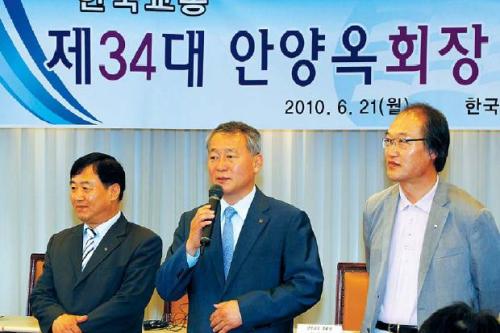The Lee Myung-bak administration’s education policies are losing ground as the largest and most supportive teachers’ organization recently turned its back on them.
“The teachers’ evaluation scheme and the school headmasters’ application system call for a fundamental change,” said Ahn Yang-ok, the newly elected head of the Korean Federation of Teachers’ Associations, last week upon starting his three-year term.
Ahn was overwhelmingly elected earlier this month.
The two policies that he tackled are the administration’s most heavily promoted projects, which have met a fierce backlash from liberal teachers’ groups.
“The teachers’ evaluation scheme and the school headmasters’ application system call for a fundamental change,” said Ahn Yang-ok, the newly elected head of the Korean Federation of Teachers’ Associations, last week upon starting his three-year term.
Ahn was overwhelmingly elected earlier this month.
The two policies that he tackled are the administration’s most heavily promoted projects, which have met a fierce backlash from liberal teachers’ groups.

“Especially, no favors or disadvantages should be given to teachers based on the evaluation system,” Ahn said.
“Should the results of the evaluation be reflected in the personnel measures, the teachers would be driven to excessively focus on the visible outcomes such as test results.”
The application system for school headmasters also lacks a clear set of standards and needs to start anew, he said.
The education head also claimed that the present education law should be revised within the year, to reflect the feedback from parents and education experts.
“Any reform in education should take place gradually, properly embracing the voices of those involved, and should not be pushed forcefully by the administration,” Ahn said.
His stance marks a complete turnover from that of the former president Lee Won-hee, who promised last August full, non-conditional support for the teachers’ evaluation system.
On the day after Ahn spoke out, the KFTA issued out an official statement, claiming that it does not intend to oppose the government policies altogether.
It nevertheless did point out in its official paper that the teachers’ community is generally dissatisfied by the competition-inducing pushes.
The KFTA, in contrast to the liberal Korean Teachers and Education Workers’ Union, has been in support of the Lee government’s education drives.
However, the teachers’ community gave the cold shoulder to the KFTA’s directions as its former head Lee vowed to kick out 10 percent of the “incompetent” teachers.
Though parents and some observers denounced the teachers’ backlash as a result of group egoism, teachers claimed that many good-willed teachers may unduly suffer from the system.
The KFTA’s new stance stands in line with the KTEU and the liberal educational superintendents in Seoul and Gyeonggi Province, who were newly elected in the June 2 local elections.
The Lee administration is determined to push ahead with its original plans despite its isolation in the education circles.
“We will make our best efforts to communicate with the newly elected superintendents on the controversial education policies,” said vice education minister Lee Joo-ho last week.
“Should the attempts fail, we will push ahead with the teachers’ evaluation bill in the National Assembly within the year.”
The ministry also quoted its recent survey which showed that 86.4 percent of the parents supported the teachers’ evaluation system.
The ministry’s strong-handed measures, however, are pushing away many teachers, some said.
“The teachers’ community is a group with a strong political disposition,” said Park Jin-ha, a primary school teacher in western Seoul.
“However, resenting the forceful policies which the present administration has been pushing, many have turned to liberal alternatives.”
Teachers generally supported liberal candidates in the local election and the KFTA president election, hoping for some turnovers, Park also said.
“Some of my colleagues used to support the ruling Grand National Party but went as far as voting for the liberal Kwak No-hyun in the June 2 election just to tackle the ongoing education policies,” Park said.
“This is how much the teachers society feels against the so-called Lee Myung-bak education reform policies.”
Some also explain that it is not the teachers’ intention to avoid evaluation on their achievement.
“Though the open classes, which have been reinforced under the evaluation system, come as a burden on all of us, I acknowledge that it is necessary as a communication tool between teachers and parents,” said Lee Jeong-seon, an elementary school teacher in Ansan.
“However, the problem is that many of the governments’ policies exclude teachers, who are a crucial factor in the education triad.”
By Bae Hyun-jung (tellme@heraldcorp.com)



![[Exclusive] Korean military set to ban iPhones over 'security' concerns](http://res.heraldm.com/phpwas/restmb_idxmake.php?idx=644&simg=/content/image/2024/04/23/20240423050599_0.jpg&u=20240423183955)

![[Graphic News] 77% of young Koreans still financially dependent](http://res.heraldm.com/phpwas/restmb_idxmake.php?idx=644&simg=/content/image/2024/04/22/20240422050762_0.gif&u=)



![[Pressure points] Leggings in public: Fashion statement or social faux pas?](http://res.heraldm.com/phpwas/restmb_idxmake.php?idx=644&simg=/content/image/2024/04/23/20240423050669_0.jpg&u=)









